Executive Summary and Main Points
Recent years have witnessed fluctuating approaches between compassion and accountability within organizations. Leaders are now exploring cognitive strategies to integrate both, pivoting towards growth-oriented accountability which fosters a culture of learning and adaptability. Key findings from the NeuroLeadership Institute emphasize the importance of perceiving accountability as a worthy challenge, an “opt-in” choice that empowers employees to embrace personal growth while fulfilling organizational goals. Three habits have been identified as being critical for nurturing this healthy perspective: thinking ahead, owning commitments, and anchoring on solutions. These practices support higher performance levels and contribute to a strong culture of trust and effective collaboration.
Potential Impact in the Education Sector
The approach of viewing accountability as a worthy challenge could greatly influence Further Education, Higher Education, and the sphere of Micro-credentials. It may encourage strategic partnerships based on trust and mutual growth, enhance digitalization efforts by rewarding innovation and risk-taking, and stimulate the adaptation of curricula to better equip students with future-ready skill sets. This paradigm shift aligns with the growing demand for lifelong learning and agile educational frameworks that can respond to a rapidly evolving global job market.
Potential Applicability in the Education Sector
Innovative applications involving AI and digital tools can be tailored to leverage the three accountability habits within global education systems. For instance, AI could be utilized for predictive analytics to help academic leaders think ahead and anticipate educational needs. Digital platforms can enforce ownership of commitments through a transparent tracking of academic contributions and engagements. Moreover, online collaborative environments can anchor solutions, offering spaces for collective problem-solving and fostering a growth mindset among students and faculty alike.
Criticism and Potential Shortfalls
Critical analysis of these practices must consider the possibility of their disproportionate impact across different countries and institutions, potentially exacerbating existing disparities. While the concept of non-punitive accountability promotes a growth mindset, there are real-world challenges in implementing these strategies, like resistance to cultural change and varying levels of resources across global education systems. Ethical considerations regarding privacy and data security also arise with the increased use of AI and digital tools. Comparative international case studies could serve as a reference for understanding the varied efficacy and adaptation of these methods.
Actionable Recommendations
International education leadership should consider incorporating these accountability habits into institutional cultures through tailored training and leadership development programs. They should also explore partnerships with technology providers to deploy AI-driven analytics for forecasting and personal development. By adopting digital platforms that encourage ownership of commitments and facilitate solution-oriented problem-solving, educational institutions can balance stringent performance metrics with a compassionate, growth-centric learning environment. Ongoing assessment and adaptation of these technologies, while sensitive to cultural and ethical considerations, will be necessary for sustained success in global higher education.
Source article: https://hbr.org/2024/06/3-ways-to-compassionately-hold-your-team-accountable

